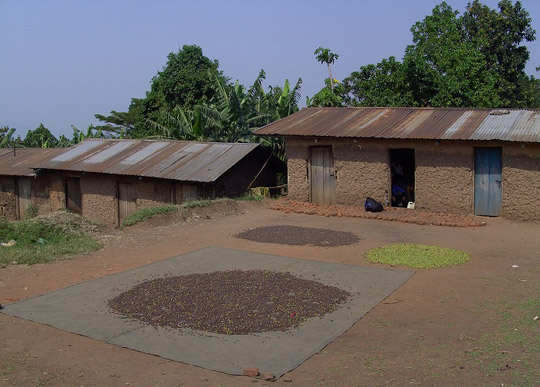Working for sustainable trade in Uganda
Coffee is the most important export commodity in many of the world’s developing countries and oftentimes coffee producers are small farmers working at subsistence level. Agricultural producers face fundamental challenges in moving from this survival-type farming to a running a profitable business which can lift them out of poverty. In Uganda 3.5 million families are employed in coffee production. A coffee farmer with as little as a few trees can produce to sell to the local market in exchange for an income to support his household. However, the price offered for coffee is usually determined by a local trader; this can leave the producer with no control over the income from his crop. Fair and ethical trade initiatives can help address some of these issues.
How does Irish Aid support ethical trade?
The Challenges for Farmers
- Securing a fair and regular price for coffee from local traders
- Access to knowledge of market values and best agricultural practice
- Environmental problems: soil erosion and coffee wilting disease
Through the Irish Fairtrade Network, Irish Aid supports agricultural producers in developing countries by funding programmes which work to mainstream international fair and ethical trading certification systems such as Fairtrade and UZT, and to facilitate access to this system for small holding producers. Through this support for ethical trade, the livelihoods of many producers in East Africa and Central America have become more sustainable by securing access to a market where they can sell their coffee, tea, vanilla or cotton for a fair price.
The Irish Fair Trade Network East Africa programme aims to develop the capacity of small-scale producers to comply with certification standards, enabling them to access and benefit from the international markets for certified products. The improved agricultural practices combined with the higher prices paid mean that the farmers have a more sustainable future as coffee producers.

Implementing Sustainable Agricultural Practices
Kasungu Dimitirio proudly guides us around his one acre farm where he grows coffee, vanilla, sweet potato, bananas and beans, and keeps livestock. He attributes the productivity of his farm to lots of hard work, and to the support he received from a project promoting sustainable trade. Having a successful farm allows Kasungu and his wife Cecilia to support their three children and to make plans for a better future.
Kasungu was recruited into this project two years ago. The project, which is funded by Irish Aid through the Irish Fairtrade Network and implemented by Kawacom coffee exporters, works with small farmers in Western Uganda to improve the quality of their coffee to a certifiable standard. Farmers are then linked to reliable markets where they can sell for a fair price. Kawacom is currently working with 3,200 farmers, and to date three quarters of these farmers are certified.
85% of the people living in this region of Uganda depend on agriculture for their livelihood. Coffee growing is a popular choice for farmers to generate income as many farmers own some land and the climate here is suitable for Arabica coffee which is highly in demand. Produce can be sold to the local market or exported to Kampala. However, most of the farming activity is done at subsistence level and there are challenges to operating a productive farm. Securing a fair and regular price for coffee from local traders is not always easy, and access to knowledge of market values and best agricultural practices is hard to come by. Environmental problems such as soil erosion and coffee wilting disease are also prevalent in this part of Uganda.
Since joining the Kawacom project Kasungu and Cecilia have received training in sustainable farming practices and farm management specific to producing certifiable Arabica coffee. Farming aids were given to the family such as tarpaulins, gum boots and hoes and they learned about environmental protection. Kasungu explains how, thanks to the support received, his farm now produces good quality UTZ certified dry Arabica coffee for export. Kawacom buy coffee from the farm twice a year for a higher price than Kasungu was previously getting from coffee traders. In the meantime, the other fruits and vegetables on the farm can be sold to generate extra income. This farmer proudly tells us that his farm has been such a success, Kawacom have made it a model farm for the project, meaning that other farmers come to his land to learn how he has implemented the training received. Today, with a secure income to rely on, Kasungu and Cecilia plan to build a brick house to replace their temporary home, and to buy more livestock. Previously, he explains, the family were unable to plan ahead.


